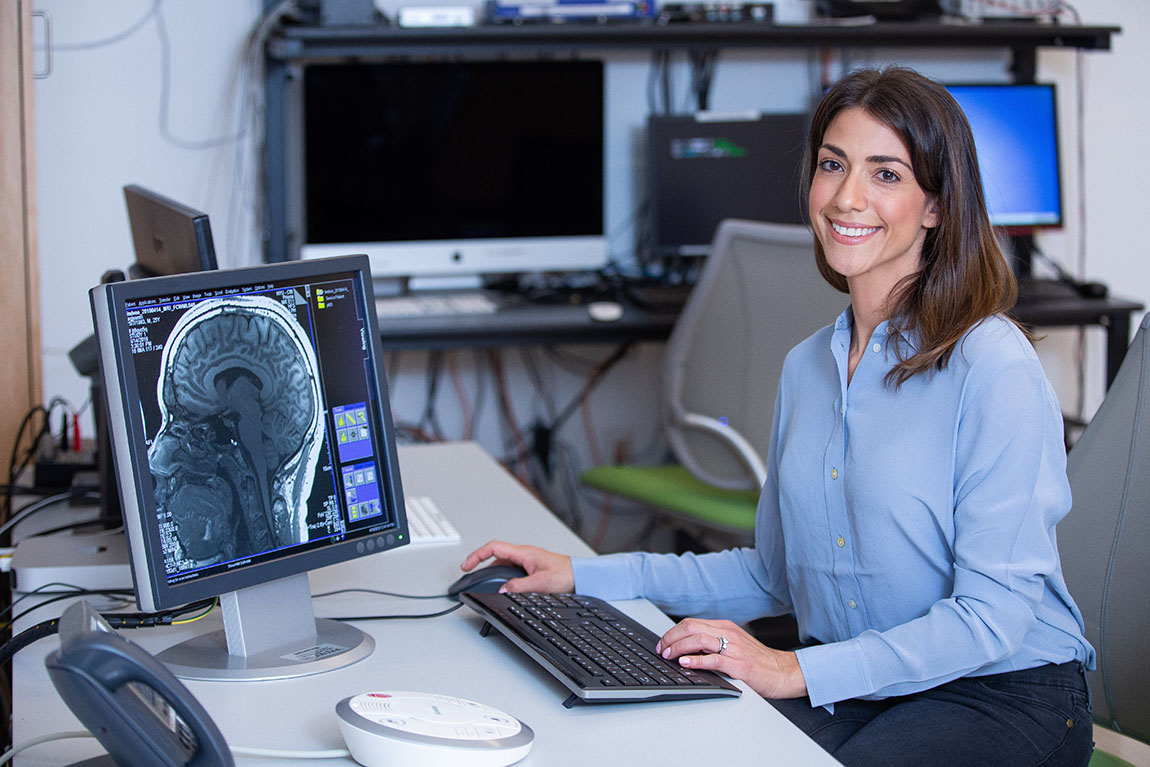Research on the Brain
In her postdoctoral fellowship, Candace Raio ’02 uses functional neuroimaging to study how stress affects self control.By: Meghan Kita Tuesday, May 7, 2019 10:53 AM
 Candace Raio ’02 is now a postdoctoral fellow at New York University School of Medicine. Photo by Brooke Slezak.
Candace Raio ’02 is now a postdoctoral fellow at New York University School of Medicine. Photo by Brooke Slezak.Students in several of Associate Professor of Psychology and Neuroscience Gretchen Gotthard’s classes read a paper published in 2010 in the journal Nature. In it, the researchers detail how using extinction—so, controlled exposure to a feared stimulus—after a fear memory is recalled and reactivated can dampen the sense of fear that memory elicits once it's stored in the brain again (a process called "reconsolidation").
The study was the first to examine extinction during reconsolidation in humans, and this technique's effects were found to be more permanent than those of traditional extinction. The study was the master’s thesis of Candace Raio ’02, a psychology and English double major who’s now a postdoctoral fellow at New York University School of Medicine.
“Candace was before my time at Muhlenberg, but I'm excited to see that she's a former Muhlenberg student,” Gotthard says.
Since coauthoring that noteworthy publication, Raio earned a doctoral degree in cognition and perception from NYU training under Elizabeth Phelps. Then, she studied how cognitive strategies for dealing with threat responses change when people are under stress. During her postdoctoral fellowship with Paul Glimcher, she shifted the focus of her research toward how stress affects decision-making. To fund her work, she received a three-year postdoctoral fellowship from the National Institute of Health and, in 2018, a two-year Young Investigator Award from the Brain and Behavior Research Foundation. Currently, her research program is exploring the effects of stress on self control.
“People often think of self-control as synonymous with willpower, that is: ‘I’m effortfully trying to resist an impulse,’” Raio says. “A more comprehensive way is to view self-control as a decision: People are weighing the costs and benefits of using cognitive resources to exercise control.”
Raio’s work uses a functional MRI machine—so, one that’s able to show what’s happening in someone’s brain as they perform tasks—to see which brain regions are activated when a person is asked to exert self-control, and how that changes when they’re doing it under stress. The stress group participants place their forearm in ice water to elevate their stress hormones before they’re asked “to make choices about rewards that would require different levels of self-control to resist,” Raio says, while the control group participants place an arm in room-temperature water before completing the same task. The idea is to find a way to measure these brain responses in healthy individuals under stress in order to develop tools that can be used to help people with “patterns of maladaptive choice” around behaviors like gambling or substance use, for example, that are commonly exacerbated under stress.
Raio’s road to research was a winding one: She worked for a few years after graduation before realizing she missed academia, and she began her master’s program at NYU part-time while keeping her full-time role in corporate market research. She’d conducted an on-campus survey as part of her Research Methods in Psychology course at Muhlenberg, but her first deep dive into academic research came during her master’s program.
“I always had many questions about human behavior. I later learned that basic research is one path to answer those questions,” Raio says. “I feel very lucky to be in a field where every day I’m able to pursue questions that I’m passionate about and feel like I’m contributing to the scientific community.”
